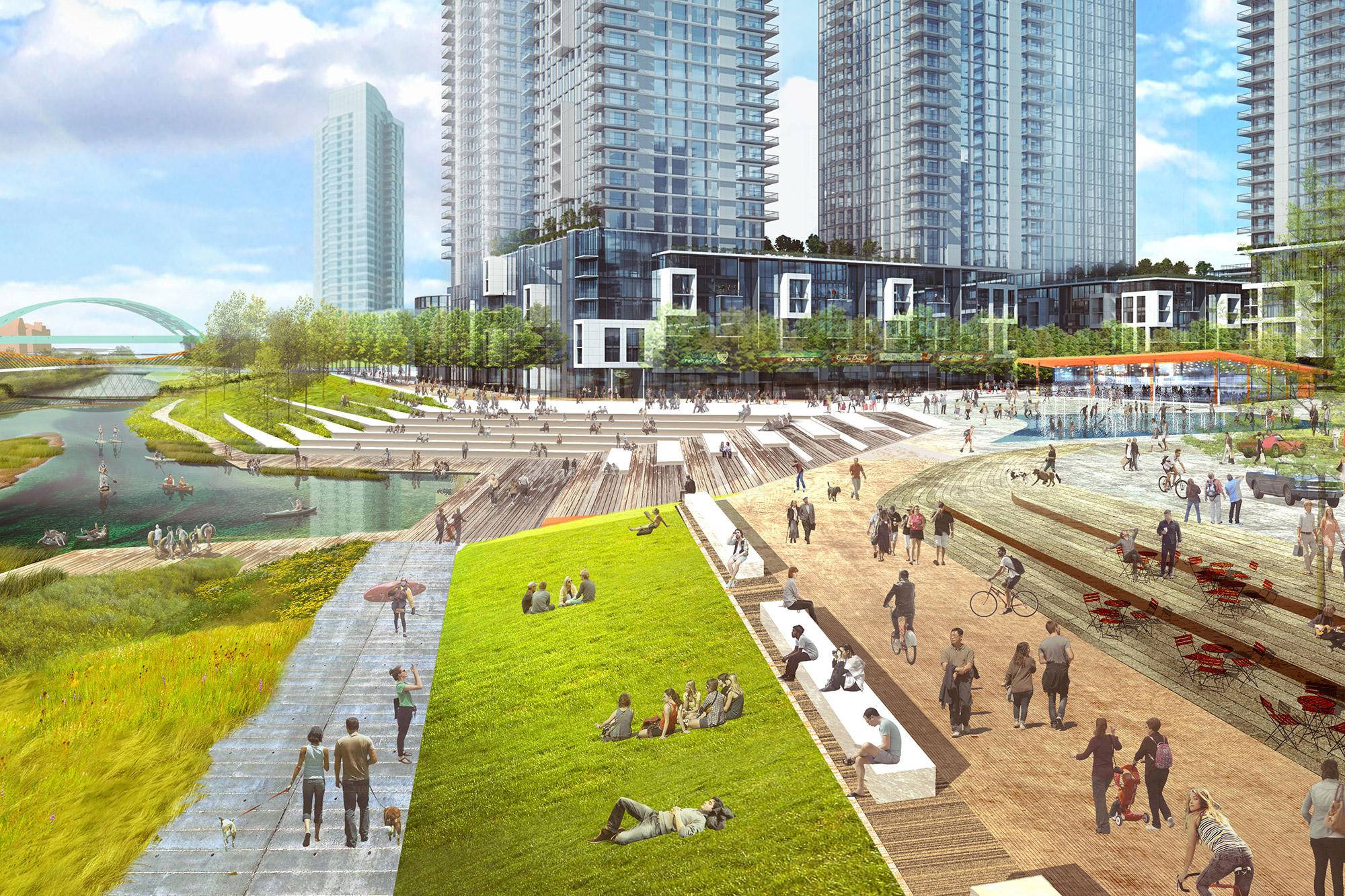The Denver City Council passed a package of rules Monday that lays the foundation for a new downtown next to our existing downtown. Maybe people will call it NewDo. Hopefully not.
The vote was unanimous, with City Councilman Chris Herndon absent.
Right now the imaginary district, encompassing nearly 60 acres of parking lots, river frontage and Elitch Gardens rides across the street and the creek from Lower Downtown, is known as The River Mile (RiMi?). And it will be a long while before there's a "there" there.
There's a 20- or 30-year horizon on the neighborhood's completion. That's how long it takes to create homes for maybe 15,000 people and 25,000 jobs, the streets and utilities to support them, and the places to that make a place a place -- restaurants, shops, parks (12 percent of the site), daycares, drycleaners, plus parks and public access to a revitalized South Platte River.
"We're at the darkest part of the dawn," said Kristofer Johnson, a senior city planner with Denver Community Planning and Development. "The sun hasn't even come up yet."
Still, Monday's city council votes represented a major milestone in the process. One measure solidified what's allowed to be built, created design standards. Another changed the city's code to create affordable home requirements and height incentives for developers to build them. Another measure executed a legal agreement between landowner Revesco Properties and the city. It lays out expectations for things like affordable housing, infrastructure, and public space.
An estimated 1,200 homes of about 8,000 will be affordable to people making between 30 and 100 percent of the area median income, according to city documents. The units will be rented, for sale and range from studios to family dwellings.
After a bunch of underground and underwater work gets done, the market will dictate when the area known as Central Platte Valley-Auraria will go vertical, said Rhys Duggan, Revesco's president and CEO, in an interview.
"If we're in the middle of a deep, dark recession I don't imagine we will be building on this site very soon," Duggan said. Otherwise, he said, "We'll be full speed ahead."
Assuming the market is good, someone could move into a home at River Mile in four to five years at the earliest, Duggan said. Here's a look back at where the nascent "neighborhood" has been, and what needs to happen before things really get going.
What's happened so far
April 11, 2017
The area just southwest of Lower Downtown wins an infamous national award for the worst "parking crater" in America.
April 13, 2017
Elitch Gardens' owners, which includes Revesco, announces its intent to develop a 17-acre parking lot next to the amusement park.
March 12, 2018
Sparked by developers' intent to eventually replace the amusement park with an urban district anchored by two light rail stations and public river access, the planning department begins outlining zoning rules to make it possible. Developers envision $665 million worth of new streets, bridges and parks.
August 13, 2018
The city council approves special taxing districts to fund projects.
November 28, 2018
The city council discusses requiring affordable housing plans for developers looking to build in the new neighborhood.
December 17, 2018
The city council votes to approve a rezoning of the area, a developer agreement and an amendment to the law to include affordable housing requirements and incentives in the new district.
What has to happen before the neighborhood is a neighborhood
~ 1 year from now
- Denver and Revesco sign off on an infrastructure agreement after hammering out specifics on streets, parks and river enhancements.
- The city appoints members of a new design review board, through an application process, to shepherd new projects through aesthetic requirements.
~ 2 to 4 years from now
- The South Platte gets dredged and dug deeper to remove the neighborhood from the flood plane.
- The soil, which is polluted from when it hosted a train yard and gas plants, undergoes remediation to clear the environment of hazards.
- Streets and sidewalks are built on a brand-new grid.
- Sewage, storm water and electrical infrastructure are installed.
- A parking garage is built to replace the surface lot next to Elitch's.
~ 4 to 5 years from now at the earliest
- Homes are built and the first residents move in.
Eventually
Elitch's moves elsewhere, opening up more land for development.













